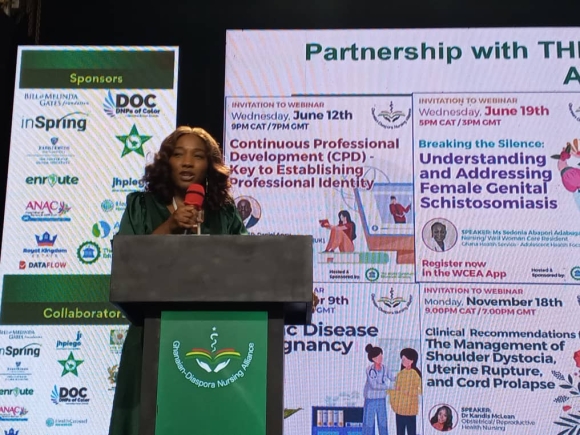
Stakeholders commit to halting nursing brain drain at Ghanaian-diaspora conference
Members of the Ghanaian-Diaspora Nursing Alliance (G-DNA) and the Ghana Health Service have resolved to collaborate on finding workable solutions to prevent trained nurses from leaving Ghana after their training.
To achieve this, G-DNA plans to establish a team to work with local and international partners to incentivise nurses to work in villages and local communities while ensuring they are well-remunerated.
“Every nurse has a right to work. We at G-DNA want to train unemployed nurses and midwives in a project dubbed ‘Mama CVD’ where midwives are trained to use a point-of-care ultrasound device for pregnant women in the hinterlands who have heart failure; that the device can easily detect this heart failure and refer them to the nearest teaching facility for proper care,” Professor Yvonne Commodore, co-founder and chairperson of G-DNA, told Graphic Online on the sidelines of the three-day nursing conference, which began January 3 at the Labadi Beach Hotel in Accra and is expected to conclude January 5, 2025.
Brain-gain
Commenting on this year’s theme, *‘Brain-Gain: Investing in Nursing Education in Ghana and Africa through Collaboration,’* Professor Commodore emphasised that the conference serves as a platform for nurses and midwives from the diaspora and Africa to interact with their Ghanaian counterparts to explore ways of providing the best healthcare for Ghanaians.
“The alliance was formed two years ago with the mission to link Ghanaian nurses and midwives in Ghana with their counterparts in the world and draw people from the African diaspora to work together with African nurses and midwives to improve the health of Ghanaians,” she stated.
She added that the conference would see experts in nursing discuss topics such as leadership, innovation, and how nurses can advocate for policies to improve Ghanaian healthcare. It will also serve as a clinic to teach nurses best nursing practices.
“Nurses will be taught how to perform CPR, they will learn how to address postpartum haemorrhage, learn about leadership—how to become an effective and better nursing leader or midwife,” she stated.
Exodus of nurses
Professor Commodore called for a holistic approach to addressing the mass exodus of Ghanaian nurses seeking greener pastures abroad.
“A bridge must be built between these nurses and their homeland where they can transfer their work and experience back to their country of origin for the benefit of patients in their country,” she emphasised.
She urged stakeholders to find ways to prevent unemployment among nurses and midwives and to tap into the expertise of Ghanaian healthcare professionals abroad to enhance nursing education in the country.
Scholarships
She revealed that G-DNA has awarded scholarships to nine brilliant but needy students at the Ghana College of Nurses and Midwives to help them complete their education and support Ghana’s healthcare system.
“This Sunday, we are having a fundraising gala, and the proceeds will go into the scholarship fund we have created to support nurses and midwives in Ghana,” she stated.
MOU
The Acting Registrar of the Nursing and Midwifery Council, Mrs Philomena Woolley, disclosed that her outfit had signed a Memorandum of Understanding (MOU) with G-DNA and the Ghana Nursing Association UK. This agreement aims to bring back third-generation nurses and Ghanaian-trained nurses who have migrated abroad to teach best practices in Ghana.
“We have registered these nurses who are sojourning abroad and link up with them, so it is easier for them to come and offer short courses and clinics to hone the skills of Ghanaian nurses in the country,” she noted.
She explained that the tripartite collaboration also enables Ghanaian nurses to be trained in the UK and other countries to acquaint themselves with international best practices.
“Once you are learning, you are gaining knowledge. When you gain knowledge, you use the knowledge gained to improve on the services you provide and practice,” she said.
Mrs Woolley revealed that many nurses in Ghana have taken advantage of this MOU to broaden their knowledge in the nursing profession.
“Someone said there are three categories of nurses in Ghana: category A are nurses who, whatever you do, they will leave; category B are those who, whatever you do, they will stay; and category C are those who you must pamper to stay. So those willing to stay, we need to do short courses for them here and offer them incentives, and that is what this collaboration is aimed at,” she stated.
Appeal for support
She appealed to the government and corporate entities for more infrastructure to expand faculties for teaching and learning new areas of the nursing profession.
She also called for more trained experts in nursing to help educate students on advancements in the profession.
